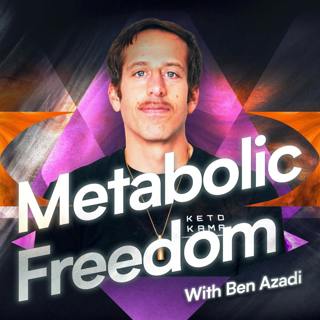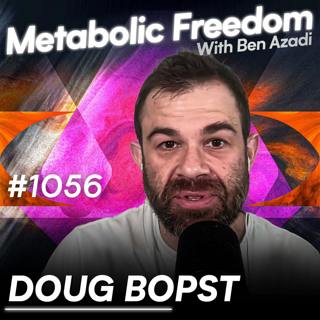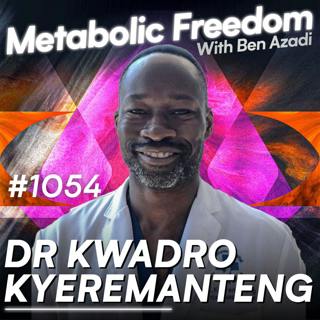
#1059 The 6 Biggest Lies Your Doctor Told You About Fat Loss, Aging, and Metabolism—And What to Do Instead With Ben Azadi
In this episode, Ben Azadi reveals 6 truths your doctor won’t tell you about fat loss, aging, and metabolic health. Learn why fasting beats grazing, why you should eat fat to burn fat, how your lifestyle—not your genes—determines your health, and why muscle is your ultimate longevity organ. Ben also shares practical tips on protein intake, metabolic blood tests, and the right type of exercise for long-term results. 🔗 Get the book + free bonuses: http://www.metabolicfreedombook.com📅 Meet Ben live: http://www.benazadi.com/events 📲 Track your macros: http://www.cronometer.com/ketokamp 🔎 Find all of the Metabolic Freedom Sponsorship deals and coupon codes here: https://www.ketokamp.com/sponsorship-deals
20 Juli 18min

#1058 The Scary Truth About School Cafeteria Food: How It’s Wrecking Our Kids’ Brains, Hormones, and Metabolism — With Ben Azadi
In this eye-opening episode, Ben Azadi reveals the dangerous truth behind school cafeteria food in the U.S. He breaks down how ultra-processed meals—loaded with seed oils, artificial dyes, sugar, and hormone-disrupting chemicals—are harming kids’ brains, metabolism, and long-term health. What You’ll Learn: How school food is linked to cancer, obesity, and early puberty Why blood sugar crashes are often mistaken for ADHD The impact of seed oils and additives like Red 40 and BHT How food industry politics shape what kids are fed What parents can do to protect and nourish their children Helpful Resources & Links: 📘 Get Metabolic Freedom + free course: http://metabolicfreedombook.com 🥩 Paleo Valley beef sticks (clean snack): https://paleovalley.com/store/beef-sticks 🛒 Thrive Market clean grocery discount: https://bit.ly/46Npfyv 🌱 Farm-to-school support: https://soulswest.org/ 🎤 Ben’s live event schedule: https://benazadi.com/events/ 🔎 Find all of the Metabolic Freedom Sponsorship deals and coupon codes here: https://www.ketokamp.com/sponsorship-deals
19 Juli 18min

#1057 The Hidden Dangers of One Meal a Day: How to Burn Fat Without Wrecking Your Hormones With Ben Azadi
In this episode, Ben Azadi breaks down why doing OMAD (One Meal a Day) long-term can slow your metabolism, disrupt hormones, and stall fat loss. He explains how chronic caloric restriction can cause thyroid suppression, muscle loss, and elevated cortisol, leading to fat gain—especially around the belly. 🔑 What You’ll Learn: Why OMAD works short-term but fails long-term Signs of metabolic adaptation and hormonal imbalance The importance of protein intake and muscle preservation How to implement Metabolic Switching (16:8, 18:6, OMAD 1x/week, Feast Day) How to restore leptin sensitivity and avoid weight loss plateaus 📘 Grab Ben’s book + FREE metabolism course:http://metabolicfreedombook.com 🎤 Upcoming live events:http://benazadi.com/events 🔎 Find all of the Metabolic Freedom Sponsorship deals and coupon codes here: https://www.ketokamp.com/sponsorship-deals
17 Juli 15min

#1056 Addiction Isn’t What You Think – The Surprising Root Cause (And How Doug Bopst Beat It)
What does it take to completely rewrite your story? In this powerful episode of the Metabolic Freedom Podcast, Ben Azadi sits down with Doug Bopst—a man who’s walked through the darkest valleys of addiction and incarceration and emerged with a mission to help others reclaim their lives. Doug opens up about the raw, real journey of breaking free from the chains of limiting beliefs and how fitness, purpose, and a strong community became the cornerstones of his recovery. He shares why addiction isn’t just a physical struggle—it’s a spiritual one—and how choosing personal responsibility and chasing small, consistent wins helped him rebuild confidence from the ground up. You’ll also hear Doug’s take on practical fitness for real-life change, why gratitude is a game-changer, and how mindset can make or break your transformation. Whether you're battling your own inner demons or simply craving a deeper sense of purpose, Doug’s story is a reminder that no matter how far off track you feel—you’re never too far gone to make a comeback. 🔥 Key Topics Discussed: Personal journey of overcoming addiction and incarceration. Addiction viewed as a spiritual crisis rather than solely a brain disease. Importance of personal responsibility in recovery. Role of fitness and mindset in transformation. Influence of supportive relationships during recovery. The significance of finding purpose in life post-addiction. Strategies for maintaining recovery, including staying busy and structured. The impact of self-awareness and understanding triggers in overcoming addiction. Celebrating small wins as a method to build confidence and momentum. The balance between fitness as a therapeutic tool and avoiding new forms of addiction. 🔗 Links and Resources: Doug's Website: https://dougbopst.com/ Instagram: instagram.com/dougbopst Facebook: facebook.com/dougbopst 🔎 Find all of the Metabolic Freedom Sponsorship deals and coupon codes here: https://www.ketokamp.com/sponsorship-deals
16 Juli 49min

#1055 The 5 Habits That Keep Tom Cruise Looking 35 at 62: Burn Fat, Reverse Aging & Boost Energy Naturally — With Ben Azadi
Ben Azadi breaks down the five daily habits that keep Tom Cruise lean, energized, and youthful at 62. Learn how Cruise uses mobility, HIIT workouts, protein-focused meals, recovery tools, and playful movement to reverse aging and burn fat—plus tips on how to apply these habits to your life. 💡 Topics covered: Morning mobility to activate your nervous system Smart HIIT workouts to boost mitochondria & longevity High-protein, low-carb meals for energy & muscle Anti-aging skincare and cold therapy rituals How play and variety in movement improve motivation 📘 Get Ben’s book Metabolic Freedom + FREE bonus course:http://www.metabolicfreedombook.com 📅 Join Ben’s speaking tour:http://www.benazadi.com/events 📲 Track your progress with WHOOP, Oura Ring, or Apple Watch WHOOP: https://amzn.to/44uzRB2 Oura Ring: https://ouraring.com/product/rings/oura-ring-4/silver?utm_medium=iac_raf 🧊 Try Ben’s cold plunge: http://www.plunge.com (Code: KetoCamp)📺 Fitness coaching: https://www.youtube.com/@GC3FIT 🔎 Find all of the Metabolic Freedom Sponsorship deals and coupon codes here: https://www.ketokamp.com/sponsorship-deals
15 Juli 17min

#1054 This Is What ICU Doctors Wish You Knew – The Best Daily Habits to Avoid Disease with Dr. Kwadwo Kyeremanteng
What if the key to surviving critical illness starts long before you ever land in a hospital bed? In this powerful episode of the Metabolic Freedom Podcast, host Ben Azadi sits down with ICU and palliative care physician Dr. Kwadwo Kyeremanteng for a conversation that hits close to home. Drawing from years of experience on the front lines of critical care, Dr. Kwadwo opens up about the real, everyday lifestyle factors that make the biggest difference—long before illness strikes. From the overlooked power of protein and muscle mass to the simple habits of walking, managing stress, building community, and finding purpose, this episode explores what truly helps people stay resilient. Dr. Kwadwo doesn’t just talk theory—he shares real-life ICU stories that show why prevention beats prescription every time. You’ll also hear about his new book, which is all about empowering you to take your health into your own hands—using informed choices and the support of community to stay strong, vibrant, and free. If you’ve ever wondered what actually matters when it comes to long-term health, this episode will change the way you think. 🔥 Key Topics Discussed: Importance of metabolic health and its impact on ICU admissions Role of nutrition and dietary habits in preventing metabolic disorders Significance of protein intake and muscle mass for health and recovery Discussion of the ketogenic diet and its effects on metabolic health Mental health's connection to nutrition and recovery outcomes Quality of hospital food and its implications for patient healing Benefits of regular movement, including walking, for metabolic health Impact of stress management and sleep quality on health outcomes Importance of social connections and community support for well-being The role of purpose in motivating healthy lifestyle choices and overall health 🔗 Links and Resources: 📚 Get Dr Kwadwo's Book Prevention Over Prescription here: https://amzn.to/3TUTlbL 🔎 Find all of the Metabolic Freedom Sponsorship deals and coupon codes here: https://www.ketokamp.com/sponsorship-deals
14 Juli 47min

#1053 The 3 Metabolic Stages That Finally Burn Belly Fat (And What to Eat for Each One) — With Ben Azadi
In this episode of the Metabolic Freedom Podcast, Ben Azadi breaks down the 3 essential stages of fat loss—and exactly what to eat at each stage to finally lose stubborn belly fat. From lowering insulin and inflammation in Phase 1, to building lean muscle in Phase 2, and optimizing mitochondrial function with powerful biohacks in Phase 3—Ben delivers a complete roadmap to sustainable fat loss. You’ll learn the best fat-burning foods, the power of intermittent fasting, movement tips, and his favorite tools like cold plunges, sauna, and apple cider vinegar. Electrolytes: Redmond Relight- http:www.ketokampsalt.com coupon code is "AZADI" for 10% off Keto Chow- https://amzn.to/44rGF2d Ultima -https://amzn.to/4lTXjgU LMNT - DrinkLMNT.com/KetoKamp Magnesium: Upgraded Formulas: https://upgradedformulas.com/BENAZADI BiOptimizers: bioptimizers.com/ketokamp Protein supplements (optional): Kion EAAs – http://www.getkion.com/metabolic for (20% off) Equip Prime Protein – http://www.equipfoods.com/benazadi for (20% off) Ben's sauna: https://get.sunlighten.com/ketokamp Cold plunge brand: plunge.com Use code: KETOKAMP Product: https://paleovalley.com/store?pc=pvpartners&oid=25&affid=68 (ACV Complex) UseCoupon code "ketokamp" for 5% off 📘 Get Ben’s New Book — Metabolic Freedom Includes the 3-stage protocol, biohacks, fasting tips, and more! Available on Hardcover, Audible, Kindle & Spotify 🎁 Bonus: Free Metabolism Course 👉 http://www.metabolicfreedombook.com Ben is speaking LIVE across the U.S. and globally (Orlando, Tampa, Pensacola, Saudi Arabia & more). Details & tickets: http://www.benazadi.com/events 🔎 Find all of the Metabolic Freedom Sponsorship deals and coupon codes here: https://www.ketokamp.com/sponsorship-deals
13 Juli 17min

#1052 The 7 Most Dangerous Meats You’re Probably Eating Daily (And What to Choose Instead) With Ben Azadi
In this eye-opening episode of the Metabolic Freedom Podcast, Ben Azadi breaks down the 7 most dangerous meats that are harming your metabolism, gut, hormones, and overall health—even the ones labeled “healthy.” From factory-farmed chicken to deli meats and farmed salmon, Ben explains how these meats are produced, why they’re harmful, and what to eat instead. He also shares a shocking case of chicken-triggered panic attacks and his favorite sources for clean, regenerative meats. 🔑 Key Takeaways: Most conventional meats are full of toxins, antibiotics, and inflammatory fats. Factory-farmed chicken and pork are major sources of hidden health issues. Better swaps include grass-fed, pasture-raised, and wild-caught options. Learn how meat production affects stress, inflammation, and even mental health. Get Ben’s go-to resource for clean meats: www.ketokampmeat.com Order Metabolic Freedom for a 30-day fat-burning plan: http://metabolicfreedombook.com 💡 Resources Mentioned: Regenerative farm locators: http://eatwild.com | http://localharvest.org | https://organicconsumers.org/regenerative-farm-map/ Ben’s live tour dates: http://benazadi.com/events 🔎 Find all of the Metabolic Freedom Sponsorship deals and coupon codes here: https://www.ketokamp.com/sponsorship-deals
12 Juli 17min




















